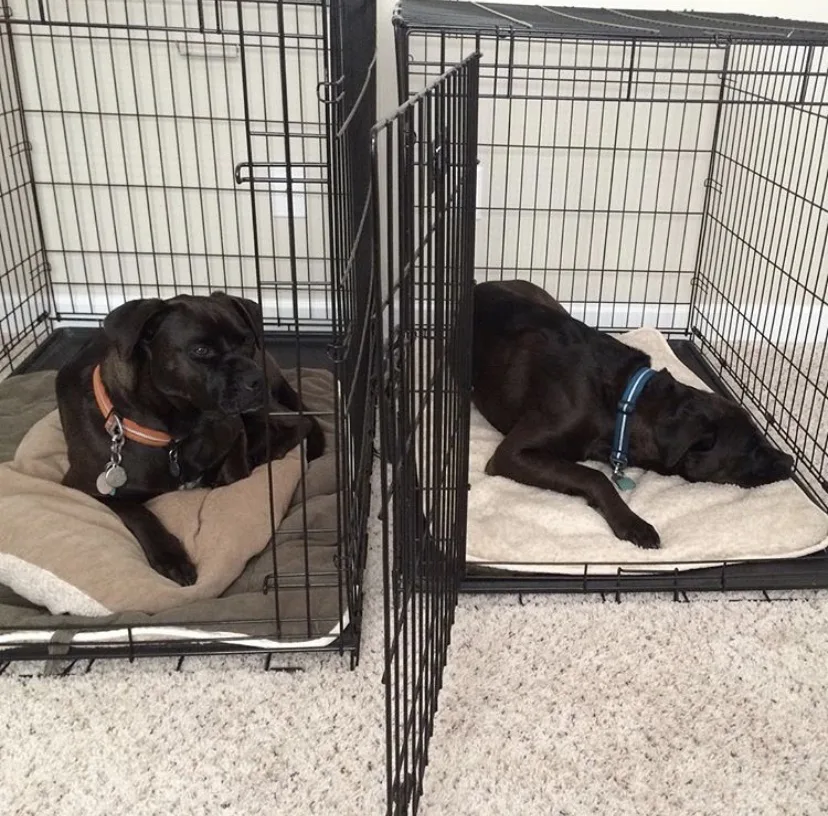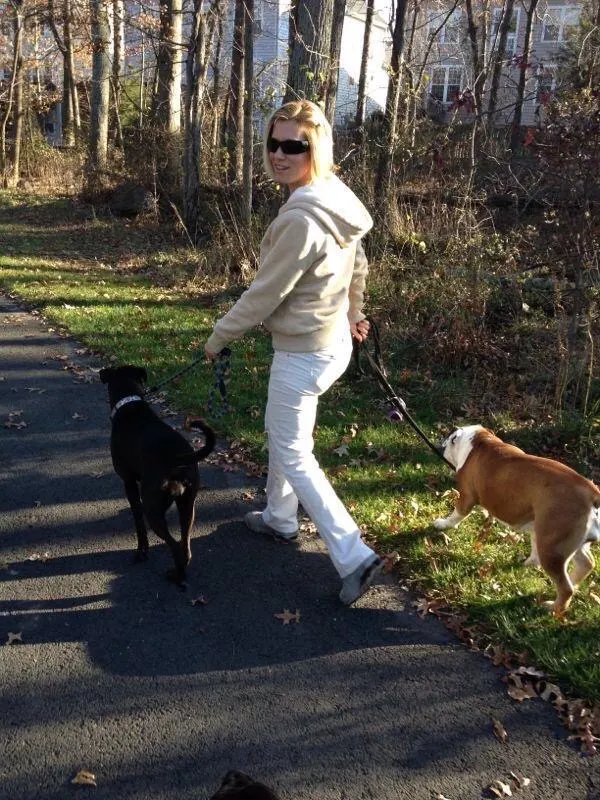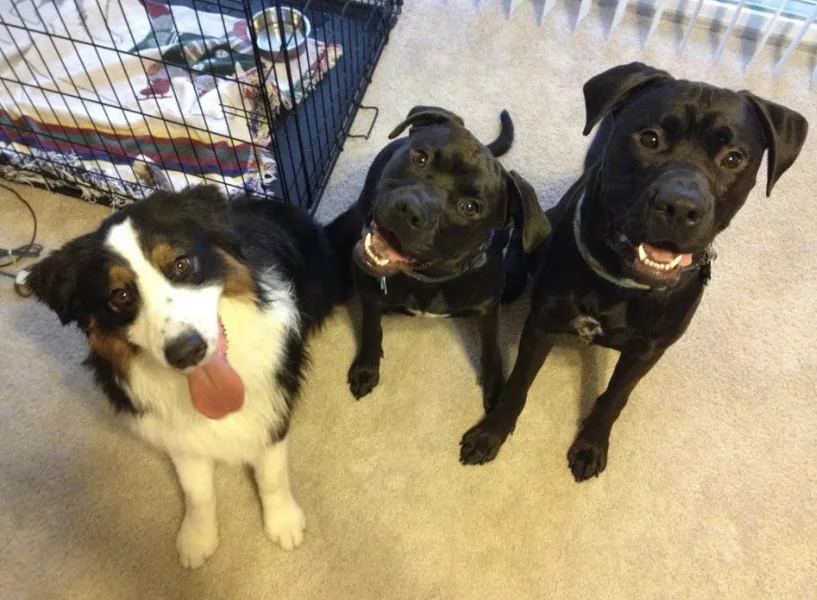I was having coffee with a friend and fellow dog owner the other day and told her that my next article for That Mutt would be on raising littermates, along with the perceived challenges that come along with that endeavor.
She raised her eyebrows and said “What do you mean? Why would that be considered a challenge?”
When I gave her the littermate bonding rundown, she laughed out loud.
“So essentially the equivalent of saying that I can’t have human twins because they would bond too much?! That’s ridiculous.”

In short – I agree. I think it’s completely ridiculous that raising littermates is considered by some to be challenging at best, and a recipe for disaster at worst because of the possibility of littermate syndrome, or the strong bond they have.
Now don’t get me wrong, raising multiple puppies at once is absolutely challenging! It’s time consuming, energy draining, and outright expensive, especially when those puppies are larger breed dogs who eat a lot!
That’s why I encourage everyone who’s thinking about bringing multiple puppies home to do their homework beforehand, analyze their schedule, and establish a support system.
You can find more information on how to manage multiple puppies exceedingly well in the section below titled How to successfully raise multiple puppies. That being said, I believe that raising two littermate puppies is no more challenging than raising two puppies in general.
Raising littermates is a controversial topic among pet owners and pet professionals
Raising two puppies from the same litter is a controversial topic for pet owners and pet professionals.
I know this from first hand experience because I successfully raised two littermates myself, boxer mixes Missy and Buzz.
That’s despite the fact that I was told multiple times that it wouldn’t be a piece of cake, simply BECAUSE they were littermates.
When I adopted them, they were just 8 weeks old and I’ll admit that I was a greenhorn doggie owner. I did do my homework though before the puppies came to live with me. My preparation included reading several different books on boxer breed specifics, raising puppies and general doggie care. However, nowhere did it say anything about the perceived challenges of raising littermates!

I first heard about this from our vet who pointed out how “brave” it was to adopt the pups together since, you know, they were from the same exact litter. OK … I heard about it again at a dog park from a fellow dog owner who said something along the lines of “Oh wow, littermates? Good luck with that!“

I next heard about it from a dog training school where I wanted to enroll Missy & Buzz in a basic obedience class. The person I talked to on the phone told me flat out that the pups wouldn’t be able to participate in the class because they were littermates!
“But why not?” I asked honestly surprised, which quickly changed to anger and frustration when the person replied “because they’d be disrupting the class, being bonded and all.”
Another OK … WTF moment.
They didn’t even know the pups or my dedication to dog ownership, so how could they assume they’d be disruptive? I received my answer to that question from the next dog training school I called because I sure as heck wasn’t going to give up that quickly. After all, I was willing to pay good money to train my dogs!

Some people worry that littermates can bond too much
We found our basic obedience class trainer in Rhonda from Dog Day Afternoon in Leesburg, VA. Rhonda had no problem whatsoever in enrolling Missy and Buzz in class. The only prerequisite was that each pup would have their own handler.
She did explain that some people, especially pet professionals, have concerns that littermates bond too closely and are too distracted by one another to pay attention to humans and other dogs. She, however, wasn’t overly concerned and happy to provide guidance along the way.
Another O…K… moment for me, but now I had gotten used to the apparent thought pattern. Mind you, not without making the determined decision that the pups would graduate this class WITHOUT disrupting anyone. And that’s exactly what happened!
Our class consisted of about 10 participants, and the only dog who truly disrupted it was a small terrier. That’s because his owner couldn’t (and wouldn’t) follow Rhonda’s instructions and kept babying him. She ended up dropping out of class, but everyone else stayed, had a good time, and graduated together.

How to successfully raise multiple puppies
Now, like I briefly mentioned previously, I prepared myself for the arrival of my Boxer mix puppies Missy and Buzz several months ahead of time. I wholeheartedly recommend that’s what you do as well if you’re interested in keeping your sanity throughout the puppies’ first year with you!

But all jokes aside, know what to expect and gather all puppy paraphernalia beforehand such as:
A breed specific book. Know what you’re getting yourself into as far as a specific breed is concerned! You should choose one that fits your lifestyle.
If you’re an active hiker and mountain biker, an English bulldog won’t be a good fit! Likewise, if you’re more of a couch potato and don’t enjoy outdoors activities, you really shouldn’t decide on an active breed like a Husky or a Labrador retriever. I personally like the Terra-Nova series of breed-specific books.
A book on raising puppies. You’ll learn about the importance of socialization and how to go about it. Alternatively, watch YouTube videos on the subject of puppy care.
I devoured all of Cesar Millan’s books, which cover all doggie life stages:
- How to Raise the Perfect Dog: Through puppyhood and beyond
- Short Guide to a Happy Dog
- Cesar’s Rules: Your way to train a well-behaved dog
- Be the Pack Leader
- Cesar’s Way: The natural, everyday guide to understanding and correcting common dog behavior
All necessary supplies. Purchase them before your puppies move in with you, that way you won’t have to rush and scramble once the little ones are home with you. This includes:
- Crates
- Pet gates and/or playpens
- Feeding and water bowls
- Food (dry, wet, freeze-dried, home coked or raw)
- Training treats
- Teething toys/chews
- Collars and leashes
- Beds (Paw.com is a sponsor of That Mutt)
- Grooming supplies like brushes
- Tags with the puppies’ names and your phone number
You’ll be off to a good start once you’ve gathered these initial supplies. Next, try to come up with support ideas for medical and lifestyle emergencies.
They don’t have to be perfectly thought out and implemented by the time your puppies move in, but it’s a good idea to start brainstorming rather sooner than later.
Is pet insurance for you if you are raising littermates?
I remember dedicating an entire weekend to researching medical dog insurance providers and listing the pros and cons of every single one I found before the pups came to live with me.
I made the decision to go with medical dog insurance and am ever so grateful I ended up enrolling Missy & Buzz with PetsBest.
PetsBest covered 90% of Missy’s cancer treatment and Buzz’s broken molar surgery, as well as a few other minor vet expenses, meaning the plans paid for themselves.
My current dog Wally also has pet insurance, but he’s covered through Healthy Paws.
Healthy Paws is an insurance provider I don’t recall reading about when I did the research for Missy & Buzz. The medical insurance industry for pets has come a long way since I first did the research in 2011. Wally’s monthly insurance rate is $32.52 and covers both illnesses and accidents.
If you decide against medical dog insurance, it’s a good idea to set up a savings account just for your puppies’ unexpected medical expenses or to dedicate a credit card just for those. There’s nothing more stressful and frustrating than experiencing a broken doggie limb or cancer diagnosis and not being able to afford it.
Know that most medical dog insurances won’t accept dogs with certain preconditions. If you decide to go with medical dog insurance, do it right from the get-go while your puppies are healthy.
Understand the time and financial requirements of raising littermates
I was a stay-at-home doggie mom for the pups’ first 6 months with us, so raising the puppies became my full time job. I truly mean that. Potty training them from our 3rd floor apartment included multiple trips outside in the middle of the night.
See our post: Potty training a puppy in an apartment
During the day, there were countless more trips downstairs and back up for more potty breaks, walks, and social interactions with fellow residents and some of their dogs. I will say that socializing the puppies to a variety of people was no problem whatsoever because EVERYONE wanted to say hi to the cute puppies!
Besides potty breaks and walks, I spent a lot of time playing with the puppies and training them. We started with the basics of sit and down, taking treats nicely from my human hands, chewing on doggie chews only, and incorporating polite behavior around food.
The good thing about investing my time is that it did pay off! The pups were potty trained and had turned into polite little canines by the time they were about 6 months old.
In addition to my time investment, there was the financial one. Be aware that literally all your dog expenses are going to be doubled or tripled, depending on how many puppies you’re raising. Maybe they’re even quadrupled! This includes:
- Food
- Toys
- Accessories
- Dog training classes
- Vet expenses
- (Medical) insurance costs
- Pet sitting funds when you can’t take your pups along on a business or personal trip.
Start thinking about a support system for your puppies
A support system can help you out when life throws you a curveball and you need someone to step in for you. You might get sick or injured and not be able to walk your pups yourself.
Or maybe one of your coworkers quits and you have to work longer hours for a little while until somebody new is hired.
You may also just need a two-hour break from raising those puppies and go for some coffee or a movie! I certainly did, and hired a professional dog walker every now and then.
I actually became friends with her as she was the owner of a dog walking business who lived in the same apartment complex.
She helped me out several times with the pups when I needed a breather, and then I actually started working for her business when the pups were 6 months old. That was my introduction to the pet services industry that I’ve been in for 8 years now.
So professional dog walkers and pet sitters are certainly worth looking into, but reliable friends and family are a good start.
Check out That Mutt’s post Overnight Pet Sitting Rates where Lindsay and I talk about pet sitting rates and the different types of pet services.
Additional tips for raising littermates
You already know to be prepared for some pushback from pet professionals if you’re raising littermates. Since one of the fears associated with raising littermates is their potential for overly bonding to one another, make sure to separate them on a regular basis and engage them individually.
You can do this by incorporating the following:
- Crate them separately. Get a crate for each pup so that they each have their very own space. Missy and Buzz were crated together in a larger crate for their first 2 months with me, until they were 4 months old. After that, they each had their own crates.
Buzz ended up with the original large crate the pups shared, and Missy moved into a slightly smaller one. The picture below actually features them when they had both walked into the other pup’s crate! Yes, my puppies were silly like that from time to time.

- Take them on occasional separate outings such as walks or visits to the vet. If one of your pups shows potential for an agility class for example, take just him, but not the other pup.

- Schedule playtime with other dogs. You can do this at your place, somebody else’s, or maybe at a local dog park.


- Challenge them physically and mentally to keep them focused on you. I taught Missy & Buzz a game where I’d play hide and seek with them on several different mental levels. Sometimes, I’d ask them to come find me together.
The command for that was “Puppies, come find me!” Other times, I’d ask them to come find me separately. I’d say “Missy, stay. Buzz, come find me!” and vice versa. They totally had this game down and we LOVED playing it together. I miss doing that with them.
Benefits of raising littermates or multiple puppies at once
It might sound like it’s nothing but work and strategies, but the biggest benefit of raising littermates or multiple puppies at once is the joy they bring you.
The joy of watching them grow out of their disproportionately huge puppy paws into beautiful adult dogs, along with the joy of having them look at you for guidance.



It’s also great that they have each other to entertain themselves when you’re in need of some me time. They’ll race around and wrestle together in a way that a human just can’t.
Guard dogs times two or however many puppies you brought home with you! There’s actually an expense you may NOT have when you have several pups at home – the cost of an alarm system! I always felt incredibly safe when I was home alone with Missy & Buzz once they had turned into their adult versions of themselves.
Now that they’re no longer with me, I wish I could go back in time and do it all over again.
In case you were wondering, I lost Missy to cancer and Buzz now lives with my ex.
Despite the amount of time, work and money invested, the years I shared with Missy & Buzz were some of the best of my life. I miss them dearly and am deeply thankful for the many puppy raising and dog training lessons they taught me over the years.
Now we’d like to hear from you!
Do you have experience raising littermates or two or multiple puppies at once?
If you have any questions, let us know in the comments!
Barbara Rivers writes regularly for That Mutt. She is certified in raw dog food nutrition from Dogs Naturally Magazine and the author of three ebooks about balanced raw dog food. She is a blogger at K9s Over Coffee.

Lucy from Argentina
Friday 23rd of September 2022
I’m so glad I got to read your story… my roommate and I decided to adopt two Jack Russel Terrier siblings, male and female. We want to have a dog for each one of us because we know we’re not going to be living together forever (maybe a couple more years, but who knows), and won’t be able to commit to share custody of a single dog. I was really scared because i only seem to find negative articles about adopting litter mates, but your story and the comments made me a bit less worried. Hopefully we manage to raise them properly, as we are separate individuals with separate lives, and that will probably help with bonding with each dog separately. They’re coming home next week, so we’re hoping for the best here! Loved to read this. Thank you so much for sharing!
Robin
Thursday 19th of August 2021
Thank you for this article! While preparing for two puppies, I admit I was not prepared for the scathing reactions when I told people. Yikes. So glad to hear that peaceful littermates are possible.
Angela Crudgington
Wednesday 4th of March 2020
Such a good read! I helped raise 2 bottle baby puppies and foster failed with one. Both are females and they get to see each other from time to time since one of our friends adopted the other one. They were besties when living with us together, but now that they have their own lives our dog hates her sister. such a bummer, we were hoping they'd be life long friends.
Nichole
Monday 27th of April 2020
I'm getting a pair of brothers next week, and the internet warriors have descended upon me. I've read up on littermates, and I feel prepared for what's ahead, but everyone is an expert these days. Thank you for sharing?
Johnice Reid
Sunday 16th of February 2020
I have ALWAYS had littermates save once and never again. I raised two Beagles from different breeders and I spent 14 years in deep regret. Prior to that, I have had littermates and once again currently have littermates. They are completely different personalities and require very different corrections and training methods. As have every pair I have lived with since 1945.
I grew up with Boxers and as an adult I prefer Hounds, Hounds are more like humans than any other breed I have worked with, thus I am devoted to Hounds. They are difficult in ways that 'dogs' are not yet I do not want a dog to fetch, roll over and other things some humans think are cute. I want a companion, someone who is distinctly different than myself and has an independent thought now and then.
Yes, Hounds are like non-vocal humans in comparison to a human roommate, no chatter and they can be taught to only speak when on the hunt or in my case lure coursing. I do not hunt. Back to littermates, I want even temperaments that is the benefit as I see it with littermates, and every pair I have lived with passed away relatively close to each other.
I never separate them and we are together 24/7, we sleep together and if they must be away from one another they are fine with that. My current pair (males, I always have males), curl up on the sofa with me in the evening and receive equal attention and praise, as needed. They have a level of devotion and attention to me which swells my heart at times, theycan also be rather head-strong. That is how Hounds are and I respect that.
I can only write about Hounds because I did not raise my Boxers or any other breed, my father chose Boxers. Littermates are kept throughout Europe and the breeder who is raising Borzoi, my next Hound, has 11 Hounds and 4 are lillermates from one breeding and 4 others are aslo littermates from another breeding. The only issues for her is that when the girls come into season she boards out the males to prevent any unwanted matings.
I have no clue how or when this littermate syndrome became a thing, I do wish it would stop and that people take a look at the people who are not capable of raising their dogs as individuals with seperate personalities.
Monika Duff
Tuesday 2nd of June 2020
Loved reading your comment. Totally agree with the last paragraph. We have littermate canoodles 7months old tomorrow.
norman
Saturday 18th of January 2020
Amazing Article... Yes rising two Dogs is like rising two twin babies. need that much attention and focus to grow them... it is also good for them, they get a company of each other and grow old together.